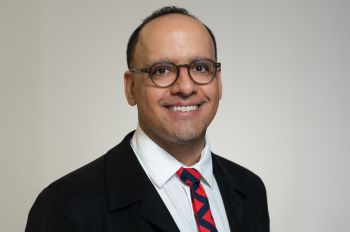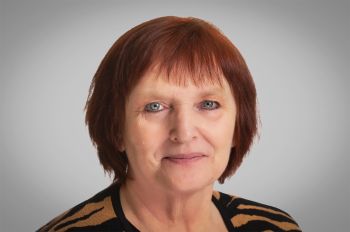Star Chicago-Kent Moot Court Team Finishes Competitive Career with Semifinal Placement in National Civil Rights Competition

A Chicago-Kent College of Law Moot Court Honors Society team that earned multiple awards and high-ranking placements over the course of its academic career has competed in its final match—as semifinalists in a prestigious civil rights competition.
Judges remarked on how the competitive talents of Hayley Loufek ’23 and Ryan Martin ’23 complemented each other well. Martin, a theater major as an undergrad, often adapted and improvised responses to the rhetorical probing of judges. Loufek, on the other hand, was seen by judges as calm and methodical, meticulous in her preparation and citation of case law.
“It’s kind of fun being [Martin’s] partner because you never know what’s going to come out of his mouth,” says Loufek. “Whatever the judges want to talk about, he’ll talk about it with them. Ryan was born for moot court.”
“So were you,” Martin says, remembering how one judge joked that Loufek was “unflapped” by judges’ many attempts to throw her off-balance.
On October 7, the duo competed in the Civil Rights and Liberties Moot Court Competition at Emory University. The duo finished as semifinalists, and their brief was ranked seventh-best out of those submitted by the 28 teams who competed.
The two had to argue both sides of a fictional United States Supreme Court case, filed by a homeless woman who was arrested for violating a city’s anti-camping ordinance. The charges were later dropped, but not after the woman spent three days in jail. The woman was attempting to stop the city from further enforcing the ordinance.
A former teacher who said she lost her job due to the COVID-19 pandemic, the woman also was immunocompromised and did not want to go to a city homeless shelter because of crowding and health concerns.
The case revolved around the cruel and unusual punishment clause of the Eighth Amendment; specifically, whether it was cruel and unusual to subject someone to a punishment they arguably couldn’t avoid. While it is unconstitutional to criminalize someone’s status, as opposed to their conduct, at issue was whether homelessness was a “status” and whether the woman’s decision to camp on the streets was one that could have been avoided.
When arguing for the city, Martin noted that as a teacher, the woman had put herself in similarly crowded situations.
Loufek, on the other hand, was responsible for arguing whether or not the woman had standing to sue the city.
To have standing, she must have suffered an injury in fact—and was her arrest enough for an Eighth Amendment claim? Wouldn’t she have had to have been convicted to meet that “injury in fact” standard?
When representing the woman, Loufek argued that the Eighth Amendment also applies to what can be made criminal—that there was a substantive limit to what she should have been arrested for in the first place. Thus, the arrest should be enough.
The team advanced successfully through three preliminary rounds, an octofinal, and a quarterfinal before being eliminated in the semifinals. By the rules of the competition, to eliminate potential judge bias, neither they nor the judges were told who their opposing teams were.
Earlier this year, Loufek and Martin were regional co-champions of one of the largest moot court competitions of 2022: the American Bar Association’s National Appellate Advocacy Competition. The Emory competition was their last as competitors; the two will serve as coaches during their final year of law school.
When asked to reflect upon her competitive moot court experience, Loufek says, “I loved it. When I first got to law school, I didn’t know what options there were for legal careers, and I was relieved when finding out about transactional careers. Then I found moot court, and I liked public speaking. I learned to enjoy both.”
Adds Martin, “I find it just very intellectually thrilling. I call it ‘law school improv.’ I love when a judge takes me in a direction I hadn’t considered before. And it’s a great way to meet a lot of people.”
“I'm so proud of Hayley and Ryan. Once again, hard work and moot court savvy led these two very skilled advocates to an impressive finish,” says Cherish Keller, director of Chicago-Kent’s Ilana Diamond Rovner Program in Appellate Advocacy. “It was a fantastic final showing as competitors, and I look forward to them sharing their expertise as they pass the torch and coach our junior members in the spring.”
Martin grew up in Tacoma, Washington, and received his bachelor’s degree in theater from Northwestern University. Before enrolling at Chicago-Kent, he worked as a legal assistant for the Evanston-based Law Offices of Barry A. Schultz, P.C., now called Marvin and Associates. He has externed for Cook County Judge Allen P. Walker, and was a summer associate at Sidley Austin LLP, where he plans to start as an associate upon graduation.
Loufek grew up in Aurora, Illinois, and received her bachelor’s degree in English from the University of Kansas. She is clerking for Ottosen DiNolfo Hasenbalg & Castaldo, Ltd. in Naperville, and has externed in the legal services department of Lurie Children's Hospital.
A second Chicago-Kent team also competed in the Emory competition. Madeline Moore ’23 and Janie Sanford ’24 reached the octofinal, and ranked as the competition’s fifth- and sixth-best oralists, respectively.



